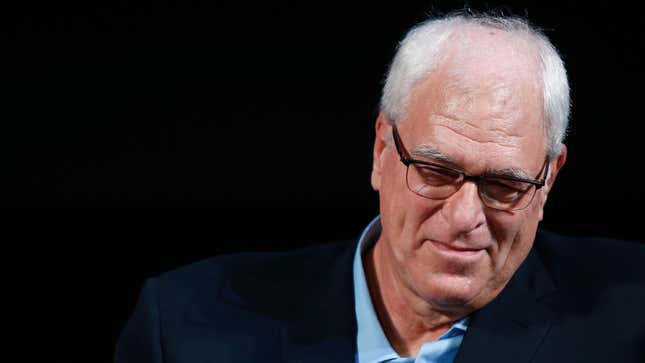
They say “never meet your heroes,” and while Phil Jackson was never a personal hero of mine, many did look up to Jackson, especially here in Chicago, where he led our beloved Bulls to six titles in the 1990s. During that time, when the United Center was brand spanking new and the near West side of the city not jam-packed with Starbucks and Soul Cycles, he also worked right across the street from the Henry Horner Homes — one of Chicago’s most notorious and poverty-stricken housing projects.
Phil Jackson knows better
Those who remember going to Bulls games in the early 1990s no doubt remember how different, how devastated, the neighborhood was back then. There was no avoiding the blight and poverty that smacked you in the face as soon as you went West of Halsted. I remember going to a Bulls game with a lawyer I was clerking for at the time and him paying a gang member client to keep an eye on his car during the game — in the United Center parking lot.
The city began demolishing the Horner Homes in 1995, but not before the lives of some of the children who lived there were chronicled in the non–fiction book There Are No Children Here: The Story of Two Boys Growing Up in the Other America by Alex Kotlowitz, which everyone should read. The book was later turned into a movie by Oprah Winfrey.
All of this is to say that it’s hard to imagine how Phil Jackson, having worked on the West side of Chicago in the ‘90s, and later in Los Angeles, wasn’t confronted regularly — if not daily — with evidence of the myriad of ways systemic racism, like redlining and government-backed segregation, can hurt a community. He had to have been confronted with it nearly every time he went to work.
Which is why it was so disappointing to hear Jackson tell Rick Rubin’s podcast that he finds the NBA to be too political these days.
“It was trying to cater to an audience or trying to bring a certain audience to the game,” he said, “and they didn’t know it was turning other people off. People want to see sports as non-political. Politics stays out of the game; it doesn’t need to be there,” Jackson said on the Tetragrammaton podcast.
“They had things on their back like ‘Justice’ and a funny thing happened like, ‘Justice’ just went to the basket and ‘Equal Opportunity’ knocked him down,” he continued. “Some of my grandkids thought it was pretty funny to play up those names; I couldn’t watch that.”
Sounds like you’re doing a bang-up job with the grandkids there, Phil.
Imagine being so triggered by sentiments like “Black Lives Matter,” “Vote,” “Peace,” and “Equality” that you stop watching the game you coached for over thirty years and played for decades before that. For all the praise Jackson got during his tenure for being forward-thinking and progressive (He reads Eastern philosophy! He’s tight with Bill Bradley! He can keep Jordan and Pippen from killing each other!), Phil Jackson is just another white guy who doesn’t want to have to think about hard things when watching sports. And let’s be clear that watching sports and not having to think about things like racism, violence against women, anti-semitism, homophobia, and transphobia is a privilege achievable by one demographic and one demographic only — and right now that demographic is largely screaming about not drinking Bud Lite and burning Colin Kaepernick jerseys. Just fantastic company for Jackson to be in.
It serves as a friendly reminder as to what people mean when they say any given sport is “too political,” because we certainly never hear that criticism when a giant American flag is hauled onto the field before NFL games while fighter jets roar overhead. No. We hear that sports are “too political” when leagues where marginalized groups, like Black men and women, try to use their platforms to affect change, like the WNBA and, to a lesser degree, the NBA did in 2020, the summer the Black Lives Matter protests were spilling out into the streets all over America. That’s too much for Phil Jackson, basketball genius, to handle when watching a game.
And because we are always here for a Jason Whitlock self-own...
My God, dude. Eight dollars a day in toilet paper? A quick Google search reveals that 36 rolls of Scott toilet paper retail at Target for $29.99. If we divide that out by $8, it would seem that Whitlock is using more than 3.75 rolls of TP per day. And while I’m not a doctor, that seems like something you might want to mention to someone tout de suite.
Less worrisome and more expected is Whitlock joining the chorus of newly-acquired blue checks in demanding that legacy verified users pay Elon Musk $8 per month of their hard-earned money to help right the Twitter ship. It’s become increasingly clear in the last 24 hours that not nearly as many people are willing to shell out money for a blue check — which has now become synonymous with trolls and dullards — as Musk initially thought. The blue check is now being used as a punishment by Musk, who is forcing it on celebs such as LeBron James, Taylor Swift, Stephen King, and others with more than a million followers who didn’t voluntarily subscribe to Twitter Blue. This includes the accounts of now-deceased celebrities, like Kobe Bryant, Chadwick Boseman, and Anthony Bourdain. I highly recommend going over to Twitter and checking it out, just for giggles. The game of hot potato between Musk and Twitter hero dril is especially lit right now.